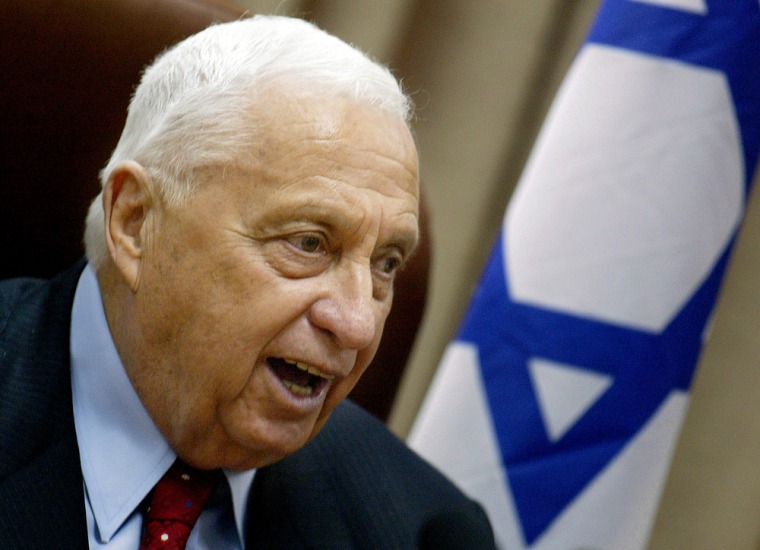Israeli Prime Minister Ariel Sharon survived a no-confidence vote in parliament Monday although the opposition, in a blow to his political prestige, tied him in the ballot.
The final tally on the no-confidence motion on the government's economic policy was 55-55, short of the 61 votes the opposition needed to topple Sharon's shaky coalition government in the 120-seat parliament.
A first count showed a one-vote majority in favor of the no-confidence motion, but parliament speaker Reuven Rivlin said that was wrong due to a problem with the electronic voting system.
Monday's ballot illustrated how vulnerable Sharon's rightist coalition has become after far-right defections last month in protest against his plan to withdraw from Gaza cost him his parliamentary majority.
Sharon asks Labor to join unity government
Earlier Monday, Sharon won agreement from veteran opposition leader Shimon Peres to try to forge a unity government that could push through the Gaza Strip pullout.
But Peres's center-left Labor Party went ahead anyway with sponsorship of one of the no-confidence motions.
Confidence votes have recently taken place on a nearly weekly basis in the Israeli Knesset, or parliament, and Sharon has yet to be harmed by any of them.
Sharon faced three no-confidence motions Monday, tying on one and beating back the other two.
Prior to the showdown, Sharon told rebellious members of his Likud Party that he would force new elections if they block his efforts to form a unity government, officials said.
The prime minister faces stiff resistance inside his party from hard-liners opposed both to the withdrawals and a partnership with the more dovish Labor Party. Sharon currently leads a minority government after defections by hard-line parties.
Key sticking points remain
Key sticking points remain to be overcome between Sharon and Peres.
Labor expects to be given senior Cabinet posts, including that of foreign minister for Peres. However, senior Likud ministers now holding these jobs have threatened to stir a rebellion in the party if removed from their posts.
The no-confidence vote occurred as U.S. Mideast envoys were in the region to discuss the Gaza withdrawal plan. White House officials Elliot Abrams and Steve Hadley were to meet with Palestinian Prime Minister Ahmed Qureia on Monday and with Sharon on Tuesday, an Embassy spokesman said.
Sharon and Peres met privately for an hour Monday morning. Both sides said the talks had gone well.
“The prime minister turned to Shimon Peres and asked him to open negotiations on Labor joining the government. He asked that they begin as soon as possible,” said Yoram Dori, a spokesman for Peres.
Peres was to meet with Labor lawmakers later Monday to discuss the invitation. A decision is to be made at a party meeting Tuesday.
Deal expected soon
Officials close to both men said they expected a deal soon.
Labor lawmaker Haim Ramon said negotiations became a realistic option after three conditions were met: Sharon’s government accepted the Gaza withdrawal plan; the ultranationalist National Union left the coalition in protest of the planned pullout; and the attorney general decided not to charge Sharon in a corruption case.
“Those were the conditions and now we will open negotiations on a range of issues,” he told Israel Radio.
Sharon turned to Labor after facing increasing opposition to his Gaza plan from far-right coalition partners and hard-liners in Likud. Defections have deprived him of his parliamentary majority.
By September 2005, Sharon plans to withdraw from all of Gaza, where 7,500 Jewish settlers live amid 1.3 million Palestinians, and uproot four isolated settlements in the West Bank.
The withdrawals are part of his “unilateral disengagement” plan, which he says will boost Israel’s security and preserve Israel’s Jewish character by giving up areas with large Arab populations. Sharon refuses to negotiate directly with the Palestinians.
Talks with Palestinians at issue
In a recent interview, Peres said he would not join the government unless Sharon agrees to resume talks with the Palestinians and to commit to a much larger withdrawal from the West Bank.
In other developments Monday, Israeli troops destroyed several buildings on the outskirts of the town of Khan Younis in southern Gaza. The army said it destroyed uninhabited shacks used by militants as cover to fire on Israeli targets.
A 72-year-old Palestinian man who lived alone and was confined to a wheelchair was buried under the rubble, his family said. Doctors said he died of a heart attack.
On Sunday, Palestinian militants from the Al Aqsa Martyrs’ Brigades, a violent group linked to Yasser Arafat’s Fatah movement, blew up a bus stop in Tel Aviv, killing a female soldier and seriously wounding five people.
It was the first deadly bombing in Israel since March.
Sharon tied the bombing to last week’s advisory ruling by the world court against the West Bank separation barrier. Israel says it needs the barrier to keep out attackers.
World court decision assailed
“The decision sends a destructive message to encourage terrorism and denounces countries that are defending themselves against it,” Sharon said.
Palestinians, welcoming the decision, planned a diplomatic assault to enforce it. However, they put off an appeal to the U.N. Security Council until after the November presidential elections in the United States, fearing a U.S. veto.
Israel has completed one-quarter of the planned 425-mile project, and cited the barrier as a key reason for the recent lull in Palestinian attacks.
The Palestinians turned to the world court, arguing that the barrier, which stretches deep into the West Bank, amounts to an illegal seizure of their land.
Sharon on Sunday ordered construction to continue, in line with a recent Israeli Supreme Court decision, his office said.
